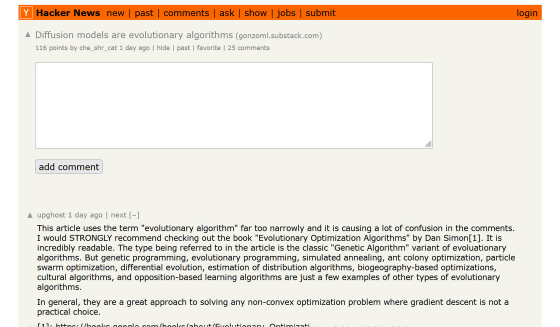Claims that the diffusion model used in image generation AI such as Stable Diffusion is an 'evolutionary algorithm'

A generative model called a diffusion model is used in image generation AI such as Stable Diffusion and DALL-E 3. A research team from Harvard University, Tufts University in the United States, and Vienna University of Technology in Austria has recently published a paper arguing that the diffusion model is essentially an evolutionary algorithm , which has attracted attention.
[2410.02543] Diffusion Models are Evolutionary Algorithms
https://arxiv.org/abs/2410.02543
Diffusion Models are Evolutionary Algorithms
https://gonzoml.substack.com/p/diffusion-models-are-evolutionary
This AI Paper Introduces Diffusion Evolution: A Novel AI Approach to Evolutionary Computation Combining Diffusion Models and Evolutionary Algorithms - MarkTechPost
https://www.marktechpost.com/2024/10/10/this-ai-paper-introduces-diffusion-evolution-a-novel-ai-approach-to-evolutionary-computation-combining-diffusion-models-and-evolutionary-algorithms/
The diffusion model is a learning model that learns the process of repeatedly adding random noise to the original data, and then makes it possible to reverse the process and 'gradually remove noise from noisy data to generate clean data.'
You can find out how the diffusion model actually works in image generation AI such as Stable Diffusion by reading the following article.
A detailed illustration of how the image generation AI 'Stable Diffusion' generates images from text - GIGAZINE

On the other hand, evolutionary algorithms are algorithms inspired by biological evolutionary mechanisms such as reproductive activity and genetic mutation. The research team argues that the diffusion model, which gradually removes noise probabilistically, is essentially the same as an evolutionary algorithm.
In addition, the research team uses the term 'Evolutionary Algorithms' in the paper, but in fact there are several evolutionary algorithms. It has been pointed out that the method mentioned in this paper is close to one of them, the ' Genetic Algorithm .'
A genetic algorithm is an algorithm that searches for approximate solutions to complex tasks by treating the data that is the solution to the task as the genes of an organism. By combining highly adaptable data from among a variety of candidate solutions (data) (mating) or by changing parts of the data (mutation), superior data is selected, ultimately resulting in a practical solution. This is similar to how organisms evolve over generations, eventually converging on a form that is adapted to the environment.
The research team interprets the addition of random noise in the diffusion model as mutation in a genetic algorithm, and the removal of noise in the diffusion model as selection in a genetic algorithm, arguing that 'the diffusion model is essentially running an evolutionary algorithm (genetic algorithm).'
Furthermore, based on the equivalence of this diffusion model to genetic algorithms, the paper proposed an evolutionary algorithm called the 'Diffusion Evolution method' that seeks solutions in parameter space by iteratively removing noise. Unlike many classical evolutionary algorithms that usually converge to a single solution, the diffusion evolution method has the advantage of being able to find multiple excellent solutions simultaneously.
The paper has also been discussed on Hacker News, a foreign social network. One user who worked on evolutionary algorithms commented, 'It is certainly possible to optimize neural networks using genetic algorithms, but it is a stretch to claim that the diffusion model is an evolutionary algorithm, and the paper did not adequately explain the connection. '
Diffusion models are evolutionary algorithms | Hacker News
https://news.ycombinator.com/item?id=42097418

Related Posts:







